 Image copyright Thinkstock
Image copyright Thinkstock When it comes to tech, there is no lack of ideas or talent in the UK.
But there is, nonetheless, an ever-growing list of promising companies that sell out or simply fail, rather than growing into British titans that could rival the likes of Microsoft, Apple, Google, IBM, Intel, Oracle and Facebook.
Below are some notable examples:
Sinclair Research

There was a time in the 1980s when video gamers and teenage coders across the UK were more likely to be hunched over one of Sir Clive Sinclair’s computers than an American or Asian-made alternative.
Sinclair Research may have only made its ZX Spectrums for domestic sale, but it licensed Timex to make clones that were sold elsewhere in Europe, the US and South America. Dozens of unofficial versions were a hit in the Soviet Union too, proving their appeal, if not a source of income.
But the firm got unstuck when it tried to enter the business market. Its Sinclair QL was designed to outperform IBM’s PCs, but its tape-based Microdrive storage was unreliable and the British company did not offer the kind of telephone support the corporate sector required.
“Their computer designs were abominable by our standards,” Sir Clive later told the BBC.
“But because… IBM had such a powerful position, I don’t think we could have challenged it.”
After the C5 electric vehicle also failed to catch on, a cash-strapped Sir Clive sold his firm’s brand and assets in 1986 to Amstrad, another domestic computer-maker.
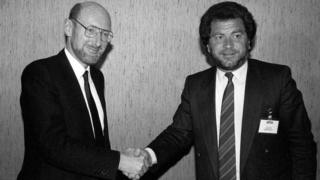 Image copyright PA
Image copyright PA Amstrad later faced troubles with computer storage of its own and eventually switched focus to TV set-top boxes before selling out to BSkyB.
Friends Reunited
 Image copyright Friends Reunited
Image copyright Friends Reunited Years before Facebook was founded, let alone open to the public, a couple from Hertfordshire and one of their friends, created a social network that attracted millions of users in the UK, Australia, South Africa and beyond.
Friends Reunited connected members with their former classmates by getting them to share the names of their old schools and the year they had left.
Over time, the theme was expanded to cover places of work, sports teams and neighbourhoods where users had lived. Spin-off sites were also created to offer online dating, job searches, message boards and ways for users to trace their family trees.
When ITV paid 175m to buy the operation in 2005, it expected to continue its red hot growth.
 Image copyright ITV
Image copyright ITV But the broadcaster made the mistake of continuing to charge users to contact each other, rather than relying on ad revenue alone, for too long.
That allowed Facebook, MySpace and Bebo to take the lead.
ITV sold the business for just 25m in 2009. Although it limped on under other UK owners until earlier this year, it never regained its momentum.
Lastfm.com (2002-2007)
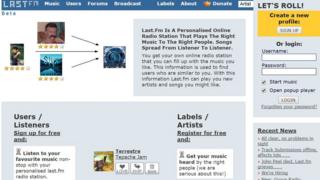 Image copyright Last.fm
Image copyright Last.fm Last.fm began its life as an internet radio station and an associated website where users listed the tracks they liked to meet others with similar tastes.
But it only really took off after it merged with Audioscrobbler, a plug-in that automatically logged songs that its users had listened to on their computer and MP3 player.
This made it possible to build up a deeper picture of its users’ habits, which in turn helped the service make song recommendations, and then later suggest nearby concerts and music videos too.
By 2007, the service had attracted 15 million users. However, rather than stay independent, its founders opted to sell out to the US media group CBS for $280m (212m).
 Image copyright Last.fm
Image copyright Last.fm They acknowledged that they had struggled to find a way to be profitable in light of the royalty and copyright fees the music industry was demanding, and said that teaming up with the US broadcaster gave them greater negotiating clout.
However, the service continued to rack up losses.
A subscription-based music streaming app was a flop, and these days Last.fm is a relatively minor player. It still recommends music but relies on YouTube, Spotify and other third-party services to provide it.
Autonomy
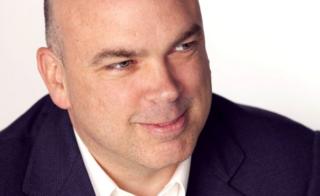
Silicon Valley might have Google, but for a time Autonomy was the UK’s most highly regarded search giant.
The firm was founded in Cambridge in 1996 and developed software that allowed its clients to hunt through “unstructured data” – emails, videos, social network posts, phone calls, images and other information recorded in apps – that was not kept in neat databases.
The service proved popular with a wide range of organisations, which used it to carry out legal checks, create archives and focus their marketing.
In 2011, Autonomy proved its data-analysis techniques had further potential when it developed an augmented reality tool that allowed smartphones to superimpose graphics over real-world views.
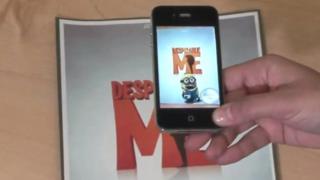 Image copyright Autonomy
Image copyright Autonomy Hollywood director JJ Abrams was among the first to use it within an app that promoted his film Super 8, and others followed.
The same year, Autonomy’s chief executive, Mike Lynch, agreed to sell the business to HP for just over 7bn. And that’s where things got complicated.
Thirteen months after the takeover was completed, HP claimed Mr Lynch had misrepresented his company’s financial position and wrote down most of its value.
The two sides are now suing each other in a case that is likely to drag on for years.
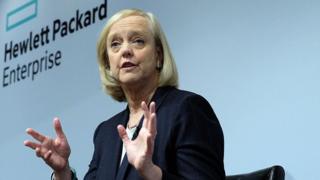 Image copyright Getty Images
Image copyright Getty Images In a final twist, HP has agreed to sell Autonomy and some of its other operations to Micro Focus, an English software developer, meaning what is left of the business will soon be controlled again from UK shores.
ARM Holdings
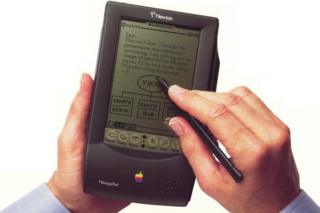 Image copyright Apple
Image copyright Apple Until very recently, ARM Holdings was the flag-waver for the UK’s tech scene.
The computer chip designer was created in Cambridge in 1990 as a joint venture between Acorn Computers and Apple.
The US firm wanted a processor to power its first hand-held device, the Newton MessagePad, but later sold its stake after Steve Jobs returned and ditched the product.
That didn’t end the relationship between the two companies though, as ARM’s designs were used in processors that powered first the iPod, then the iPhone and iPad.
Most other smartphones are also dependent on ARM’s chip creations, in addition to a wide assortment of other technology including smart TVs, cars, fitness trackers, smartwatches and drones.
 Image copyright ARM
Image copyright ARM Many people thought ARM might remain independent as it suited device-makers not to have the firm owned by one of their competitors.
But in July, Japan’s Softbank agreed to pay 24bn for it.
ARM’s management suggested the move would help it “move faster in creating new technologies”.
But its co-founder Hermann Hauser has been critical, saying that ARM could have grown “even faster” if it had stayed solo.
Swiftkey
 Image copyright Swiftkey
Image copyright Swiftkey The UK is famed for its expertise in artificial intelligence.
But several of the sector’s start-ups – including DeepMind, Magic Pony and VocalIQ – only became known to the wider public once they had fallen into Silicon Valley hands.
Swiftkey was different because it actually brought popular products to market before being taken over.
The London-based firm made a keyboard app for Android and iOS handsets.
The software predicts what its users want to write – including emojis – after they have only entered a few keystrokes.
Over time, its suggestions get more accurate as it studies their habits, and if allowed to review their social network posts, it gets better still.
Swiftkey scored a publicity coup when its tech was adapted to help Prof Stephen Hawking type twice as fast as he could before.
 Image copyright Getty Images
Image copyright Getty Images And in 2014, it decided to accelerate its growth further by making its app free to use, only charging consumers if they wanted to change the keyboard’s design and colour.
The tactic worked. By the end of 2015, Swiftkey had been installed on about 300 million devices.
But it also caused its losses to grow.
In February this year, the business was sold for a reported 250m to a deep-pocketed buyer.
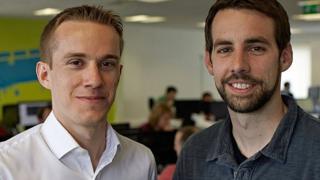 Image copyright PA
Image copyright PA “We believe joining Microsoft is the right next stage in our journey,” its co-founders blogged.
Maybe.
But it also highlights how UK start-ups often feel pressured to sell once their early-stage funding starts to run out.







